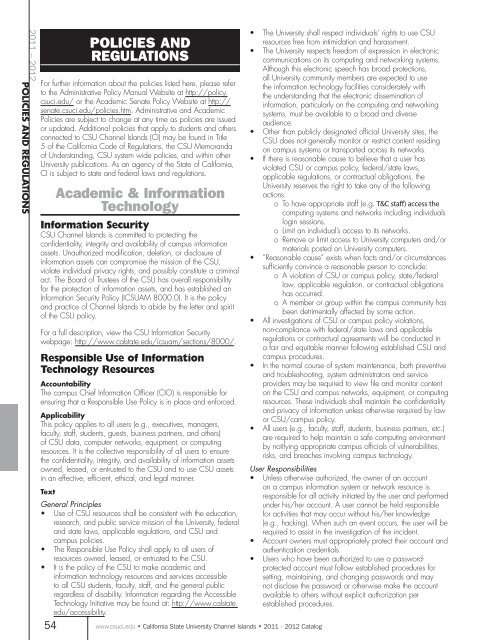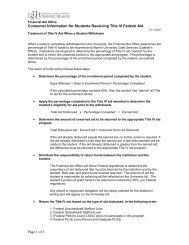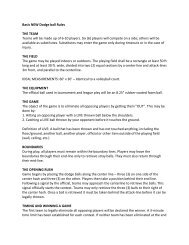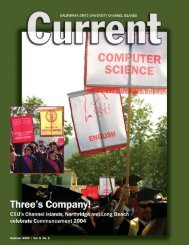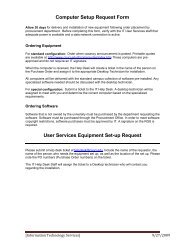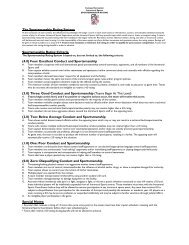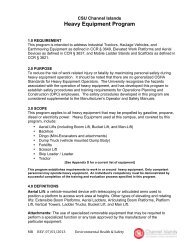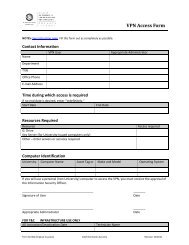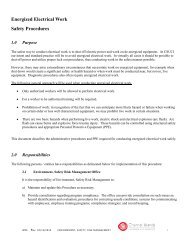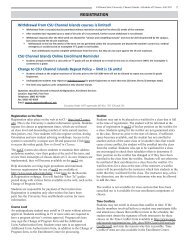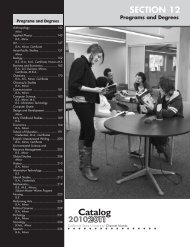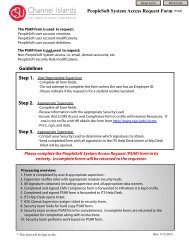Download printable catalog - CSU Channel Islands
Download printable catalog - CSU Channel Islands
Download printable catalog - CSU Channel Islands
You also want an ePaper? Increase the reach of your titles
YUMPU automatically turns print PDFs into web optimized ePapers that Google loves.
2011 – 2012Policies and RegulationsPOLICIES ANDREGULATIONSFor further information about the policies listed here, please referto the Administrative Policy Manual Website at http://policy.csuci.edu/ or the Academic Senate Policy Website at http://senate.csuci.edu/policies.htm. Administrative and AcademicPolicies are subject to change at any time as policies are issuedor updated. Additional policies that apply to students and othersconnected to <strong>CSU</strong> <strong>Channel</strong> <strong>Islands</strong> (CI) may be found in Title5 of the California Code of Regulations, the <strong>CSU</strong> Memorandaof Understanding, <strong>CSU</strong> system wide policies, and within otherUniversity publications. As an agency of the State of California,CI is subject to state and federal laws and regulations.Academic & InformationTechnologyInformation Security<strong>CSU</strong> <strong>Channel</strong> <strong>Islands</strong> is committed to protecting theconfidentiality, integrity and availability of campus informationassets. Unauthorized modification, deletion, or disclosure ofinformation assets can compromise the mission of the <strong>CSU</strong>,violate individual privacy rights, and possibly constitute a criminalact. The Board of Trustees of the <strong>CSU</strong> has overall responsibilityfor the protection of information assets, and has established anInformation Security Policy (I<strong>CSU</strong>AM 8000.0). It is the policyand practice of <strong>Channel</strong> <strong>Islands</strong> to abide by the letter and spiritof the <strong>CSU</strong> policy.For a full description, view the <strong>CSU</strong> Information Securitywebpage: http://www.calstate.edu/icsuam/sections/8000/.Responsible Use of InformationTechnology ResourcesAccountabilityThe campus Chief Information Officer (CIO) is responsible forensuring that a Responsible Use Policy is in place and enforced.ApplicabilityThis policy applies to all users (e.g., executives, managers,faculty, staff, students, guests, business partners, and others)of <strong>CSU</strong> data, computer networks, equipment, or computingresources. It is the collective responsibility of all users to ensurethe confidentiality, integrity, and availability of information assetsowned, leased, or entrusted to the <strong>CSU</strong> and to use <strong>CSU</strong> assetsin an effective, efficient, ethical, and legal manner.TextGeneral Principles• Use of <strong>CSU</strong> resources shall be consistent with the education,research, and public service mission of the University, federaland state laws, applicable regulations, and <strong>CSU</strong> andcampus policies.• The Responsible Use Policy shall apply to all users ofresources owned, leased, or entrusted to the <strong>CSU</strong>.• It is the policy of the <strong>CSU</strong> to make academic andinformation technology resources and services accessibleto all <strong>CSU</strong> students, faculty, staff, and the general publicregardless of disability. Information regarding the AccessibleTechnology Initiative may be found at: http://www.calstate.edu/accessibility.• The University shall respect individuals’ rights to use <strong>CSU</strong>resources free from intimidation and harassment.• The University respects freedom of expression in electroniccommunications on its computing and networking systems.Although this electronic speech has broad protections,all University community members are expected to usethe information technology facilities considerately withthe understanding that the electronic dissemination ofinformation, particularly on the computing and networkingsystems, must be available to a broad and diverseaudience.• Other than publicly designated official University sites, the<strong>CSU</strong> does not generally monitor or restrict content residingon campus systems or transported across its networks.• If there is reasonable cause to believe that a user hasviolated <strong>CSU</strong> or campus policy, federal/state laws,applicable regulations, or contractual obligations, theUniversity reserves the right to take any of the followingactions:o To have appropriate staff (e.g. T&C staff) access thecomputing systems and networks including individualslogin sessions.o Limit an individual’s access to its networks.o Remove or limit access to University computers and/ormaterials posted on University computers.• “Reasonable cause” exists when facts and/or circumstancessufficiently convince a reasonable person to conclude:o A violation of <strong>CSU</strong> or campus policy, state/federallaw, applicable regulation, or contractual obligationshas occurred.o A member or group within the campus community hasbeen detrimentally affected by some action.• All investigations of <strong>CSU</strong> or campus policy violations,non-compliance with federal/state laws and applicableregulations or contractual agreements will be conducted ina fair and equitable manner following established <strong>CSU</strong> andcampus procedures.• In the normal course of system maintenance, both preventiveand troubleshooting, system administrators and serviceproviders may be required to view file and monitor contenton the <strong>CSU</strong> and campus networks, equipment, or computingresources. These individuals shall maintain the confidentialityand privacy of information unless otherwise required by lawor <strong>CSU</strong>/campus policy.• All users (e.g., faculty, staff, students, business partners, etc.)are required to help maintain a safe computing environmentby notifying appropriate campus officials of vulnerabilities,risks, and breaches involving campus technology.User Responsibilities• Unless otherwise authorized, the owner of an accounton a campus information system or network resource isresponsible for all activity initiated by the user and performedunder his/her account. A user cannot be held responsiblefor activities that may occur without his/her knowledge(e.g., hacking). When such an event occurs, the user will berequired to assist in the investigation of the incident.• Account owners must appropriately protect their account andauthentication credentials.• Users who have been authorized to use a passwordprotectedaccount must follow established procedures forsetting, maintaining, and changing passwords and maynot disclose the password or otherwise make the accountavailable to others without explicit authorization perestablished procedures.54 www.csuci.edu • California State University <strong>Channel</strong> <strong>Islands</strong> • 2011 - 2012 Catalog


